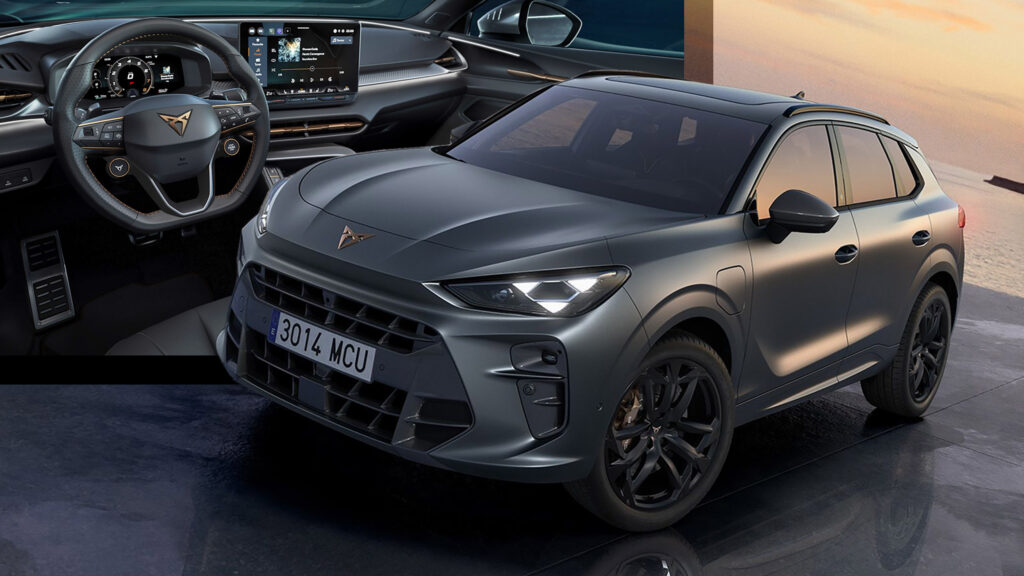- The Cupra Terramar is a new SUV with aggressive styling and a sporty chassis setup.
- It competes in Europe’s C-SUV segment, sharing its platform with the VW Tiguan.
- The lineup includes gasoline, mild hybrid, and PHEV options, with up to 268 hp.
Cupra continues to expand its model lineup with the all-new Terramar, poised to compete in Europe’s highly competitive compact SUV segment. The aggressive model will be offered with a range of gasoline, mild-hybrid, and plug-in hybrid powertrains, combined with a sporty chassis setup.
The Cupra Terramar adopts the latest styling language of the Spanish automaker, following the example of the recently facelifted Leon and Formentor. The greenhouse appears to be shared with the mechanically related VW Tiguan, but the sculpted bodywork is unique to the Cupra.
More: Seat Tarraco Axed In Favor Of Cupra Terramar
One of the exterior highlights is the aggressive headlights, flanking a sharp nose with big bumper intakes. The full-width LED taillights are interconnected with an illuminated badge in the middle, while the rear bumper is adorned by a (fake) diffuser. Depending on the trim, the Terramar sits on 18-, 19-, or 20-inch alloy wheels.
The name of the new model pays tribute to the Autòdrom de Sitges-Terramar, a former racing circuit in Catalonia.
Cupra
Moving inside, the dashboard has a similar layout to the VW Tiguan, with several Cupra-specific features making it look sportier and more premium. Tech goodies include a 10.25-inch digital instrument cluster, a 12.9-inch infotainment with an illuminated touch slider, a head-up display, and an available 12-speaker audio system by Sennheiser. The standard bucket seats are upholstered in upcycled textile or a combination of recycled textile and leather.
Sporty Chassis, Electrified Powertrains
The Cupra Terramar rides on the MQB Evo architecture, sharing it with models like the VW Tiguan/Passat, and Skoda Kodiaq/Superb. However, Cupra has sharpened up the setup for sportier driving dynamics, in line with the character of the brand.
The standard sport suspension sits 10 mm (0.4 inches) lower compared to mechanically-related models, and has a higher camper at the front. The SUV also features the Dynamic Chassis Control (DCC) system, standard progressive steering, an electrical Brake Booster, and available Akebono brakes.
The entry-level mild-hybrid 1.5 eTSI produces 148 hp (110 kW / 150 PS), transmitted to the front wheels via a seven-speed DSG automatic. The non-electrified 2.0-liter TSI generates 201 hp (150 kW / 204 PS) or 261 hp (195 kW / 265 PS), combined with the 4Drive AWD system.
Finally, Cupra offers two plug-in hybrid powertrains (eHybrid), generating 201 hp (150 kW / 204 PS) and 268 hp (200 kW / 272 PS) respectively. As with other VW Group PHEVs, they offer over 100 km (62 mph) of EV range, supporting DC charging of up to 50 kW.
Cupra proudly states that the Terramar was designed and developed in Barcelona, Spain. The SUV will be manufactured in Audi’s Gyor plant in Hungary, together with the next generation of the Audi Q3.
Deliveries of the Cupra Terramar are scheduled to begin in early 2025. Pricing will be announced closer to the market launch. The company also revealed a Cupra Terramar America’s Cup special launch edition with unique styling cues and a limited production of 1,337 units.



































